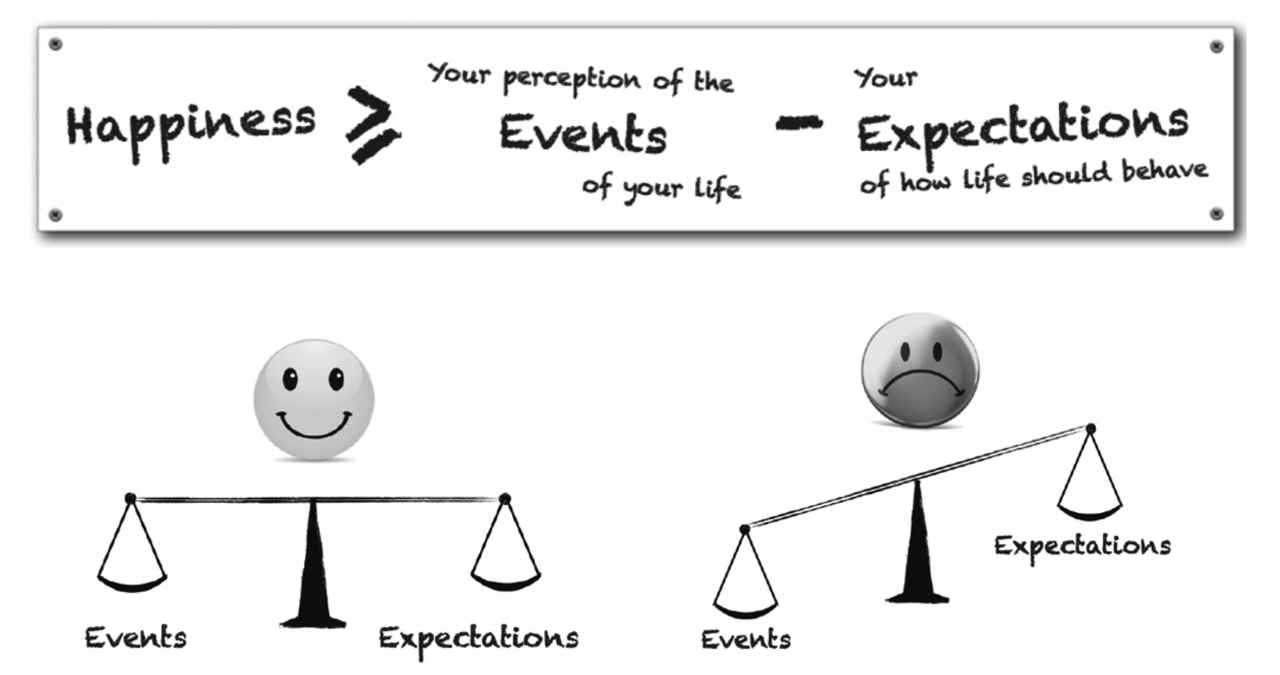Happiness is a fleeting topic in today’s world.
As humans, we are at a point in our evolution, or devolution, where we have progressed so much and so far in terms of the technologies we have developed. But those, unfortunately, have been disconnecting us from ourselves, from the people around us, from our environment and from our planet.
The reality of our being today is that we are valuing more and more, more and more, always more, not realizing that that “more” is actually taking away from our happiness, from the happiness of the people around us and from the sustainability of our own planet.
Let’s be realistic. Humanity has never had a better life. Our life expectancy is better, our quality of life is better, but we’ve never been unhappier. One in four people in today’s modern world today suffers from mental disorder, like depression. Teen suicide is at an all-time high. All of that unhappiness truly is a global problem affecting a billion people or more. These are facts that we cannot ignore.
Yet, if we manage to change the core reasons behind that constant pace for the wrong value system to one that provides the promise of a happier civilization, we might actually be in a place to change our humanity, and our planet, from the core out.
Especially for some of us who are blessed in life and yet very often we feel unhappy.
For me, it all started in my late twenties, with me being a successful entrepreneur and businessman. I had everything in life—from wealth to health to two wonderful kids from a wonderful woman that blessed me with her love and care for years. And I never appreciated any of that. Every day that passed, the more I was blessed with more, the more I became unhappy, the more I wanted more. More cars, more phones, more gadgets. More, more, more. I was miserable. I wasn’t just unhappy. I was clinically depressed.
Until my engineer’s analytical state of mind needed to understand.
Why did I feel happy until age 23, a time where I barely had anything, up until I became fortunate and blessed, and started to become unhappy? I asked myself that question over and over. What went wrong? What’s not working?
Since I couldn’t understand happiness from the spiritual and the religion point of view, I researched it from what I understood: as an engineer.
I did 12 years of research on the topic, to develop what I call “an engineering model of happiness”.
And I realized something amazing; I realized I wasn’t finding happiness in the accumulation of wealth, success, fame or even gadgets because there is no intrinsic value of happiness in any of these things. And why is that? Because happiness is not to be found outside us. Happiness is where it’s always been: inside us. We are all born happy.
Think about it. Every single infant or toddler you have ever seen in your life is happy. As long as their basic need for survival, food, shelter and a reasonable amount of love and safety is provided, they’re happy. They don’t need an Xbox to be happy, they don’t need anyone to say “your hair looks great today” to feel happy. All they need and want is for their basic need for survival to be fulfilled.
In that sense, happiness truly is the absence of unhappiness. In technology, this means that happiness is our default setting.
But then, as we grow, the machine (our head) gets filled with weird apps. An app that says the shape of your body matters, another that says money is more important than happiness, that success is more important than happiness, and so on. As we start to follow those apps, we actually start to fall out of happiness. And we start to search for happiness elsewhere and we can’t find it because we’re blocking it with societal obligations, false beliefs, and illusions.
 In the photo: Mo Gawdat. Photo credit: United by Happiness
In the photo: Mo Gawdat. Photo credit: United by Happiness
So how do you go back to that initial state of happiness? Exactly the same you would do with your mobile phone. You remove the bad apps and reset back to default setting. That means searching for the things that are causing your unhappiness. So if you strip the reasons for our unhappiness, if you remove them one by one, what’s left is happiness.
So, what is happiness?
We all have different definitions. As I looked for one everywhere and couldn’t find it, I took a different approach, that of an engineer, of a scientist. I took as many data points as I could find that described moments in my life where I felt happy and I drew those across charts, trying to find a trend line. I wrote down 92 data points of moments of my life where I felt happy – moments like “I feel happy when I see my daughter smile” or “when I have a good cup of coffee”— and I started to look for the common trends between them.
I found one thing and one thing only that was common across every single moments in my life where I felt happy and unhappy.
The result translated to “I feel happy when life seems to be going my way”. It doesn’t really matters what life gives you; what matters is that what life gives you actually matches your expectations of what you want life to give you.
Which can be summarized in a very simple equation: Your happiness is equal to or greater than the difference between your perception of the events of your life, and your expectations of how life should behave.
Now, take that equation and apply it, and suddenly you know how to resolve happiness. It’s that straightforward.
Your happiness is a simple contentment, peaceful feeling that you have when you do not want life to change. When you do not want life to give you something that you don’t have. This is happiness.
Which, by the way, is not fun. Fun is the modern world’s replacement of happiness. It is a tactic we use to stop our brain from solving the happiness equation. Because when you’re jumping up and down on the dance floor, and there is a lot of wine in your body and a lot of music in the air, you’re not thinking about the events of your life and comparing them to your expectations. You think you’re happy, but in reality you’re just temporarily masking your unhappiness.
In the photo: Mo Gawdat. Photo credit: United by Happiness
Unhappiness is an even more interesting definition
Unhappiness is just a survival mechanism. It’s your brain analyzing the world around you, looking for what’s wrong (event missing your expectation), because it wants you to be safe and survive, and alerting you in the form of an emotional signal – anxiety, fear, regret, sadness, guilt, shame– whatever negative emotion associated with unhappiness. And as it alerts you, it truly just is telling you “there’s something we need to do about this”. But instead of doing something about it, what do we do? We end up thinking about it over and over, over and over again, in what I call the suffering cycle. And as a result, we’re unhappy. But the process of unhappiness in itself really is triggered by nothing and leads to nothing.
So your brain truly is your suffering machine, your worst enemy. Every time you’ve felt unhappy was a product of this 3-pound piece of meat. It was all because of Descartes’ “I think therefore I am”. When the truth is “I am therefore I think”.
Your brain, as a machine, has 3 types of thoughts. One of them is incessant thinking when you feel concerned about something. The reason why is because you’ve done nothing about it. It happens in the midline area of your brain. The other type is insightful thinking, problem solving, which happens in the right hand side of the brain. Insightful thinking is useful because when you’re problem solving, you’re not caught up in inadequate emotions. The other is experiential thinking. That’s when you’re experiencing the world as it is. This is what meditation is about.
I have a very simple rule when it comes to dealing with my brain: it can say whatever it wants as long as it’s a joyful thought or a useful thought. For example, for the past 4 years, every day my brain attacks me and tells me “Your 21 year old son Ali died”. That’s a very painful thought. So what do I do? I answer to my brain “Yeah brain, but you know what, Ali lived.” That’s a very joyful thought.
Some other times, my brain will bring me a useless thought. For example, when my wonderful son Ali died in 2014, from a human error during a simple surgical procedure, my brain started to blame me: “Why did you take him to that hospital?”. Useless thought! So I start telling my brain “As much as I want to, brain, I cannot go back. Give me something actionable, brain, give me something positive instead”. Four days later, my brain came back and said “You should share the happiness model you engineered with the help of your son (because he was my happiness idol) and share it with 10 million people”. That’s a useful thought. And there I listened to my brain. Seventeen days after my son’s death, I started writing “Solve for Happy”, which has since become an international best seller, touching the lives of millions. That, brain, was indeed a useful thought. It will not bring back Ali, but it honors my son by helping make the world a better place.
You see, once you create a barrier between you and your brain, once you free yourself from the illusion of thought, among other illusions, your life flips upside down.
With all that in mind, I shall ask you to practice your happiness, just like fitness: an hour a day, three to four times a week. And people who share with two people, within 5 years, all together, we’ll be able to make a billion people happy.
That is my call f if it works, pay it forward. Share it with two people. Because if you share it with two people who share it with two or humanity. My personal moonshot, for Ali.
EDITOR’S NOTE: The opinions expressed here by Impakter.com columnists are their own, not those of Impakter.com. Cover Photo by Zachary Nelson















